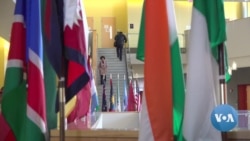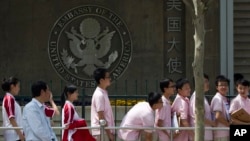Student Union
- By Aline Barros
Foreign Students Anxious Over Immigration Order
Students applying for student visas and Optional Practical Training say they feel anxious over recent immigration orders.
The U.S. government’s recent executive order to suspend the issuance of Lawful Permanent Resident permits (green cards) has left international students at U.S. colleges and universities uncertain about their enrollment and future plans.
Though the decision does not directly affect student visas, it left open the option to review nonimmigrant programs “within 30 days of the effective date of this proclamation” and could recommend “other measures to stimulate the United States economy” (during the COVID-19 crisis).
Student visas are under the nonimmigrant visa category issued to foreign nationals seeking to enter the United States on a temporary basis.
Athiyah Azeem, a journalism student at the University of Maryland who graduates in May, said she applied for Optional Practical Training (OPT) but is worried her paperwork will not be processed before her visa expires.
“When I apply for jobs, it's very much like putting on my cover letter, ‘You don't have to sponsor me.’ I have work authorization that should be kicking [in] by June 1, just because I'm banking on it,” she told VOA.
OPT legally allows college graduates with student visas to stay in the United States and work in their field of study for up to three years.
Azeem, a former intern at VOA, explained that though the executive order does not affect students like her, it adds to the anxiety.
“I get the news alert that [President Donald] Trump is going to come up with an executive order to temporarily ban immigration, I'm just, like, ‘What do I do? ... Can I stay? What's going to happen?’ ” she said.
According to U.S. Citizenship and Immigration Services (USCIS), the agency responsible for administering the nation's legal immigration system, offices will reopen on June 4, but the USCIS staff has continued to perform duties that do not involve face-to-face contact with the public.
'Absolute unmitigated disaster'
For more than a month, the U.S. government has stopped processing all nonimmigrant visas, flights have been canceled, immigration offices are closed and schools are hosting their classes online.
Rebecca Hamlin, graduate admissions chair at the University of Massachusetts Amherst, said concerns have been ongoing about international students since no one can apply to enter the country, even students already accepted at U.S. institutions.
“We've been having calls about this and conversations about this for the past month, about whether or not the students that we had admitted for fall 2020 are going to be able to come. And so far, we just don't know the answer,” she said.
Hamlin said having an executive order covering nonimmigrant visas is an “absolute unmitigated disaster for higher education in this country.”
The higher education industry in the U.S. faced documented evidence of daunting competition from other countries in 2018 that offer lower tuition, immigration pathways and less controversy for international students.
Online publication Inside Higher Ed reports an estimated 15 percent drop in overall student enrollment in the next academic year, including a 25 percent decline in international student enrollment. The findings could mean a loss of $23 billion in revenue.
The Chronicle of Higher Education reports that even though colleges are taking steps to offset deep revenue losses, universities have furloughed hundreds of employees and announced revenue hits of more than $100 million. Small campuses may suffer the most or not recover at all from the financial challenges of COVID-19.
According to the Institute of International Education’s (IIE) annual Open Doors report, there were 1.1 million international students (5.5 percent of all students) among 19.8 million total students in institutions of higher education in the U.S. for the 2018-19 school year.
China sent the most students — 369,548, or 33.7 percent of all foreign students. India sent 202,014, the second-largest number, or 18.4 percent of all foreign students.
“One of the unfortunate aspects of this is that we can't even offer a remote option for students whose student visa has not been processed in time,” Hamlin said. “Because even though they would not be physically trying to enter the United States, if they were taking classes remotely from their home country, they can't be an officially enrolled student and take classes for a grade until their student visa has been processed.”
After OPT
Azeem said she hopes the work the USCIS staff is doing during the COVID-19 crisis means her OPT application will be finalized by June.
“After OPT, I'm really hoping I will work as much as I can to make sure that I am continually employed under OPT. Then, after gaining work experience, I'm able to apply for an H-1B next year,” she said.
An H-1B visa allows for temporary employment among nonimmigrants. Immigration lawyers say becoming an H-1B holder is a natural progression for international students.
Rosanna Berardi, an immigration lawyer from Buffalo, New York, said most of her clients who applied for H-1B visas were international students.
“They are really going to be shut out, because if you're not able to get an H-1B after your student status expires, you have to return to your home country,” she said.
According to the Immigration and Nationality Act (INA), students who are not able to keep their visa status have 60 days to return to their home country.
“Some have been here for six years,” Berardi said. “They did their bachelor's degree and then a master's program. … These are people that I love being in immigration because they're just chasing the American dream. They're doing it lawfully, respectfully. They're paying the government their fees. They're paying their taxes.”
See all News Updates of the Day
- By VOA News
International students discuss US campus culture shock

International students at De Anza College in Cupertino, California, talked about culture shock in an article in La Voz News, the student newspaper.
"It felt like a major culture shock. Everything was so different, from academics to mannerism," said a student from Mexico.
Read the full story here.
These are the most expensive schools in the US
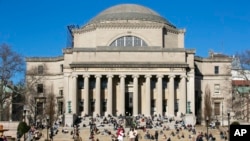
High tuition costs along with housing and food expenses can add up for students at U.S. colleges and universities.
MSNBC looked at the most expensive schools in the country, with one costing more than $500,000 for a bachelor’s degree. (June 2024)
Uzbekistan students admitted into top US universities
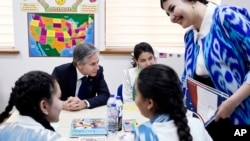
Students from Uzbekistan are among the international students admitted to top colleges and universities in recent years.
Gazata.uz profiled some of the Uzbekistan students attending Harvard, Brown, Princeton and other U.S. universities. (June 2024)
- By Stella Hsu
Reports of visa checks, deportations worry Chinese STEM students in US
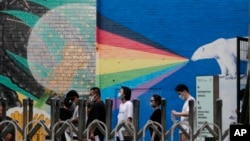
Geopolitical tensions and growing competition in tech between the United States and China appear to be spilling over into academia despite commitments from the world’s two biggest economies to boost people-to-people exchanges.
The United States remains the top choice for Chinese students seeking to study abroad with nearly 300,000 studying in American colleges and universities during the 2022-2023 school year. But reports of some cases that students and professors are facing extra scrutiny while passing through immigration and the deportation of others are raising concerns.
For Chen Xiaojin, a doctoral student studying semiconductor materials at a university in the Washington, D.C., metropolitan area, it has been six years since she returned to her hometown of Beijing.
At first, it was the COVID-19 pandemic that kept her from going home. But over the past two years, she has been deterred by accounts of Chinese students majoring in science and engineering being required to reapply for their visas upon returning to China.
She also says she is worried by reports over the past six months of Chinese students being deported, even at nearby Dulles Airport.
"My current research is relatively sensitive, and my boss [adviser] is getting funds from the U.S. Department of Defense, making it even more sensitive,” she told VOA. "I am afraid that I won't be able to return after I go back [to China]."
Chen says that if she did return to China, she would have to apply for a new visa.
In a report late last month, Bloomberg said it had found at least 20 Chinese students and scholars with valid visas who were deported at U.S. Customs since November and barred from reentry. The U.S. Customs and Border Protection Agency does not release relevant data.
Immigration attorney Dan Berger represented one Chinese student who was deported late last year. He tells VOA Mandarin that the student studied biological sciences at Yale University and was about to complete her doctorate.
She visited her family in China and got a new visa but was deported by customs at Dulles Airport and barred from reentering the country for five years. Berger said he did not see anything suspicious in the transcript of the conversation between the student and the customs officer.
"We have seen what seems like a pattern over the last six months of Chinese PhD students being turned around…. more than I've seen in quite a while," he said.
Matthew Brazil, a fellow at the Jamestown Foundation, said neither country seems willing to explain the situation. However, he believes that in most cases, the United States must have valid reasons for blocking visa holders from entering the country.
In some cases, the student’s background may not match what is written on the visa application. In other cases, customs agents may also find something that the State Department missed, and once they see it, they are responsible for taking action.
"I wish the Chinese side would be specific about their students who were refused entry,” he said. “The fact that both sides are mum on details and that the Chinese side is engaged with the usual angry rhetoric means that each has security concerns. And that says to me that there was good reason for the U.S. to stop these particular applicants."
Brazil also sees a connection between the entry denials and export control regulations issued by the United States in October 2022 that restrict China's ability to obtain advanced computing chips, develop and maintain supercomputers, and manufacture advanced semiconductors.
U.S. Customs and Border Protection is one of the law enforcement agencies authorized to investigate violations of export control regulations, he said.
"Beijing's intelligence agencies are known to focus attention on PRC [People's Republic of China] students and scientists headed abroad who study or work on dual-use technologies controlled under the Export Administration Act — compelling Chinese students and scientists to report on what they've learned when they return to China on holiday,” he said. “This has been true for decades."
Bill Drexel, a fellow for the Technology and National Security Program at the Center for a New American Security, said the U.S. government did find some cases where students tried to steal strategic technology for China.
"I think it would both not be surprising that they found some really questionable or incriminating evidence for some students,” he said. “It would also not be surprising if, in their hunt for really solid evidence, they also may have made some mistakes on other students.”
Drexel adds that “it’s just kind of an unfortunate fact of the time that we live in and the tactics that the CCP uses when it comes to these measures."
In a post on X in early May, U.S. ambassador to China Nicholas Burns tried to dispel concerns about visas and entry to the United States for students and scholars. In the post, he said "99.9% of Chinese students holding visas encounter no issues upon entering the United States.”
In an interview with The Wall Street Journal Monday, Burns said it is China that is making it impossible to promote people-to-people ties. Burns told the Journal that students attending events sponsored by the United States in China have been interrogated and intimidated.
He also said that since U.S. President Joe Biden and China’s leader Xi Jinping held their summit in San Francisco last year, China’s Ministry of State Security and other agencies had interfered with Chinese citizens’ participation at some 61 events.
At a regular briefing on Wednesday, Chinese Foreign Ministry spokesperson Mao Ning dismissed those accusations, saying that they did not “reflect reality" and that went against key understandings reached by both countries’ presidents in San Francisco.
“The United States, under the pretext of 'national security,' unjustifiably harasses, interrogates, and deports Chinese students in the U.S., causing them significant harm and creating a severe chilling effect,” Mao said. “The image of the United States in the minds of the Chinese people fundamentally depends on the actions of the United States itself.”
Drexel said he believes Burns’ comments about visas and students' willingness to study in the U.S. still ring true.
“On balance, it's still the case that American universities are overwhelmingly warm towards Chinese students and want them in large numbers," he said.
However, Berger, the immigration lawyer, is concerned about the chilling effect recent cases involving Chinese students could have.
"In general, we are being more careful about advising Chinese graduate students in STEM fields about traveling and letting them know that there is some small risk,” he said.
Even though the risk is small, it does seem to be real at the moment, he said.
Adrianna Zhang contributed to this report.
US federal judge blocks new regulation targeting for-profit colleges
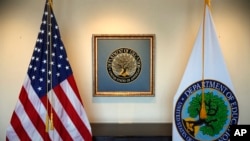
A federal judge in Texas has blocked a regulatory provision targeting for-profit colleges that was scheduled to take effect in July 2024.
Times Higher Education reports that the rule, which would affect student loans, was challenged by for-profit institutions. (June 2024)




